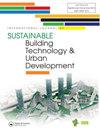提高私人建筑能源标准意图的心理决定因素:来自挪威的一项调查结果
Q4 Engineering
International Journal of Sustainable Building Technology and Urban Development
Pub Date : 2014-10-17
DOI:10.1080/2093761X.2014.954652
引用次数: 8
摘要
本文报告了对挪威家庭(N = 175)的在线调查结果,该调查分析了大幅提升住宅建筑能源标准的意图的心理决定因素的结构。来自几个心理行为模型的变量被整合到一个能源投资模型中,并在路径分析方法中进行了测试。该模型得到了数据的良好支持。投资意向主要由个人规范决定,但也受态度和自我效能的影响。自我效能感在短时间内比在长时间内更重要。个人规范与社会规范、问题意识和利他价值取向有关。自我效能感与消费者效能感和整体创新能力正相关,而与享乐主义价值观负相关。本文简要讨论了研究结果对干预和政策设计的影响。本文章由计算机程序翻译,如有差异,请以英文原文为准。
Psychological determinants of intentions to upgrade the energy standards of privately-owned buildings: results from a Norwegian survey
This paper reports the results of an online survey on Norwegian households (N = 175) that analysed the structure of psychological determinants of the intention to substantially upgrade the energy standard of a residential building. Variables from several psychological action models were integrated into a proposed model of energy investments which was tested in a path analysis approach. The model received good support from the data. Intentions to invest were primarily determined by personal norms, but also by attitudes and self-efficacy. Self-efficacy was more important in a shorter as compared to a longer time frame. Personal norms were linked to social norms, problem awareness and an altruistic value orientation. Self-efficacy was positively linked to perceived consumer effectiveness and general innovativeness, whereas to link to hedonistic values was negative. Implications of the findings for intervention and policy design are discussed briefly.
求助全文
通过发布文献求助,成功后即可免费获取论文全文。
去求助
来源期刊

International Journal of Sustainable Building Technology and Urban Development
Engineering-Building and Construction
CiteScore
1.20
自引率
0.00%
发文量
0
期刊介绍:
The International Journal of Sustainable Building Technology and Urban Development is the official publication of the Sustainable Building Research Center and serves as a resource to professionals and academics within the architecture and sustainability community. The International Journal of Sustainable Building Technology and Urban Development aims to support its academic community by disseminating studies on sustainable building technology, focusing on issues related to sustainable approaches in the construction industry to reduce waste and mass consumption, integration of advanced architectural technologies and environmentalism, sustainable building maintenance, life cycle cost (LCC), social issues, education and public policies relating to urban development and architecture .
 求助内容:
求助内容: 应助结果提醒方式:
应助结果提醒方式:


